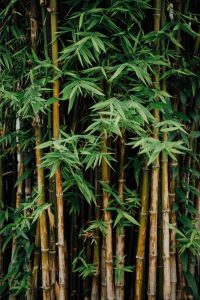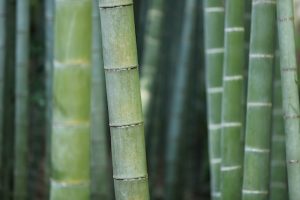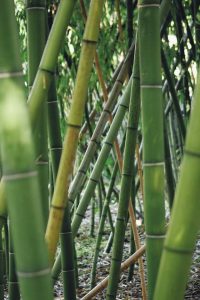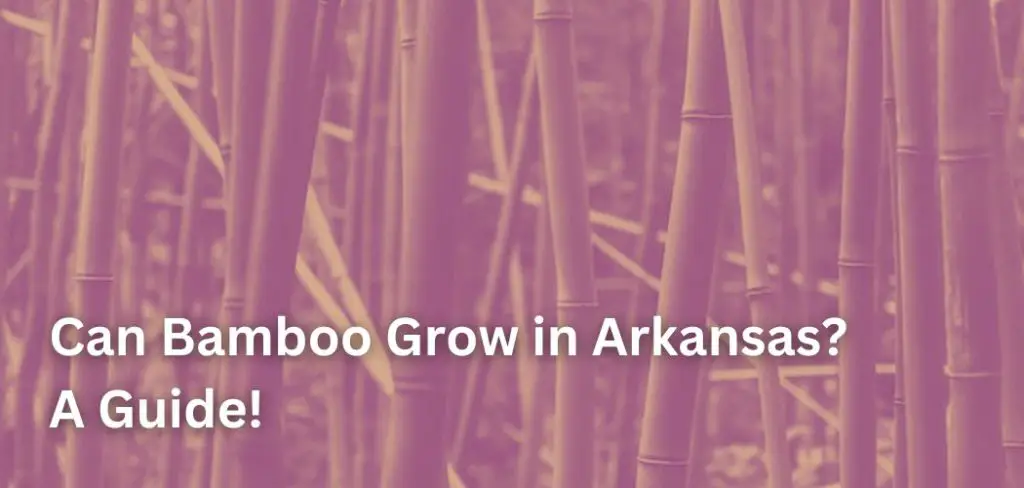Bamboo is a versatile and beautiful plant that can add an elegant touch to any garden or landscape.
It is commonly associated with Asia, but it can actually be grown in a variety of climates, including the warm climate of Arkansas.
Many people wonder if bamboo can grow in Arkansas, and the answer is yes, it can. However, there are some important factors to consider when growing bamboo in this region.
Key Takeaways
- Bamboo is a versatile and fast-growing plant that can add an elegant touch to any garden or landscape.
- While bamboo can grow in Arkansas, it is important to choose the right variety and prepare the soil properly.
- With the right care and attention, bamboo can thrive in Arkansas and provide a variety of benefits.
Understanding Bamboo
Bamboo is a type of grass that is known for its fast growth and versatility. It is a popular plant for landscaping and can be used for many different purposes, including furniture, flooring, and even as a food source in some cultures.
There are over 1,500 species of bamboo, each with its own unique characteristics.
Bamboo is classified into two main types: clumping bamboo and running bamboo.
Clumping bamboo grows in tight clusters and is less invasive than running bamboo, which spreads quickly and can be difficult to control.
It is important to choose the right type of bamboo for your needs and to understand the growth habits of each species.
One of the most common bamboo species is Bambusa vulgaris, also known as golden bamboo.
This species is popular for its tall, straight stems and golden-yellow color. It is a fast-growing species that can reach heights of up to 50 feet.
Golden bamboo is often used for decorative purposes and can be grown in a variety of climates, including Arkansas.
Bamboo is also classified into different genera, each with its own unique characteristics.
Some of the most common genera include Phyllostachys, which includes many popular species such as Phyllostachys aurea (golden bamboo), and Dendrocalamus, which includes many large timber bamboo species.
Timber bamboo is a popular choice for construction and can be used for many different purposes, including flooring, furniture, and even as a building material for homes.
It is known for its strong, durable stems and can grow to be quite tall, with some species reaching heights of up to 70 feet.
In summary, bamboo is a versatile and fast-growing plant that can be used for many different purposes.
There are many different species and genera of bamboo to choose from, each with its own unique characteristics.
It is important to choose the right type of bamboo for your needs and to understand the growth habits of each species.
Bamboo in Arkansas
Bamboo is a versatile plant that can add a touch of elegance to any home or garden. While it is most commonly associated with Asia, bamboo can actually be grown in a variety of climates, including the warm climate of Arkansas.
In Arkansas, bamboo can be grown successfully as long as it is planted in the right location and given the proper care.
According to the University of Arkansas System Division of Agriculture, the giant timber bamboo of China is hardy in most of Arkansas, except for the mountainous regions, and even there it will grow if protected from the wind.
When growing bamboo in Arkansas, it is important to choose a location that receives full sun or partial shade.

Bamboo prefers well-draining soil that is rich in organic matter. It is also important to keep bamboo well-watered during the growing season.
There are several nurseries and garden centers throughout Arkansas that offer a variety of bamboo plants for sale.
For example, in Fayetteville, Arkansas, there is a nursery called BGO (Botanical Garden of the Ozarks) that offers a selection of bamboo plants.
It is important to note that bamboo can be invasive if not properly contained.
It is recommended to plant bamboo in containers or to install a barrier around the planting area to prevent it from spreading.
Overall, bamboo can be successfully grown in Arkansas with the right care and attention. It is a beautiful and versatile plant that can add a unique touch to any landscape or garden.
Climate and Soil Requirements
Bamboo is a versatile plant that can grow in a variety of climates and soil types.
However, when growing bamboo in Arkansas, it’s important to consider the state’s climate and soil conditions to ensure optimal growth.
Climate
Arkansas has a humid subtropical climate, characterized by hot, humid summers and mild to cool winters.
This climate is suitable for growing bamboo, but it’s important to choose bamboo varieties that can tolerate the state’s temperature and humidity fluctuations.
Soil
Bamboo plants prefer well-drained soil with a pH level of about 6, which is slightly acidic. Loamy soil is ideal for bamboo growth, as it provides good drainage and nutrient retention. However, bamboo can grow in a variety of soil types, including sandy, clay, and rocky soil.
It’s important to note that bamboo can become invasive if planted in soil that is too fertile or moist. To prevent this, it’s recommended to plant bamboo in soil that is not too rich in nutrients and to avoid overwatering.
Sunlight
Bamboo plants require full sun to partial shade for optimal growth. In Arkansas, it’s best to plant bamboo in areas that receive at least six hours of sunlight per day.
Drought Tolerance
Bamboo is a drought-tolerant plant, but it still requires adequate water to thrive. When planting bamboo in Arkansas, it’s important to ensure that the soil is moist but not waterlogged. During periods of drought, it’s recommended to water bamboo plants deeply once a week.
Overall, growing bamboo in Arkansas is possible with proper consideration of the state’s climate and soil conditions. By choosing the right bamboo varieties and providing adequate sunlight and water, bamboo can thrive in Arkansas gardens and landscapes.
Planting and Care
Bamboo is a low maintenance plant that can grow well in Arkansas with proper planting and care. Here are some important things to keep in mind when planting and caring for bamboo:
Planting
When planting bamboo, it is important to choose a location that receives full or partial sunlight. Bamboo can tolerate a variety of soils, but it prefers well-drained soil with a pH between 5.5 and 6.5. It is also important to choose a species of bamboo that is suitable for the climate in Arkansas.
To plant bamboo, dig a hole that is twice the size of the root ball and fill it with a mixture of soil and compost. Place the bamboo in the hole and backfill with soil. Water the bamboo thoroughly after planting.
Care
Watering is important for the growth and health of bamboo. Bamboo should be watered regularly to keep the soil moist but not waterlogged. During hot and dry periods, bamboo may require more frequent watering.
Fertilizing bamboo can help promote growth and prevent yellowing of leaves. A slow-release fertilizer high in nitrogen can be applied in the spring and summer.
Pruning bamboo is not necessary, but it can help control the size and shape of the plant. Dead or damaged canes can be removed at any time. To prevent the spread of bamboo, running varieties should be contained with a barrier.
In summary, planting and caring for bamboo in Arkansas requires choosing a suitable location, watering regularly, fertilizing, and pruning as needed. With proper care, bamboo can thrive in Arkansas and add a touch of elegance to any home or garden.
Growth and Development
Bamboo is a fast-growing plant that can add beauty and elegance to any garden or landscape. It is a versatile plant that can be grown in a variety of climates, including the warm climate of Arkansas.
Bamboo grows from rhizomes, which are underground stems that produce roots and shoots. The rhizomes grow horizontally and can spread quickly, making bamboo an excellent ground cover. The buds on the rhizomes produce shoots that grow into culms, which are the bamboo stalks.
During the growing season, bamboo can grow to its full height and diameter in its first year. Unlike trees and bushes in the garden, bamboo does not grow taller or wider in the following years. Instead, the growth in the coming years will only be to replace leaves.
Bamboo shoots sprout from the base of the culm and grow upward. The leaves of the bamboo plant are long and narrow, and they grow in clusters along the culm. As the bamboo plant grows, it develops a thick, woody stem that can be used for a variety of purposes, including construction, furniture, and crafts.
In Arkansas, the best bamboo varieties to grow are those that are hardy and can withstand the state’s climate. The giant timber bamboo of China is a magnificent plant that can grow to 70 feet tall with stems over 5 inches in diameter. It is hardy in warmer parts of Zone 7 and South but usually only attains really grand size in frost-free areas. Vivax and dulcis are other favorites that also mature quickly.
It is important to note that bamboo can be invasive if not properly contained. The rhizomes can spread quickly and take over a garden or landscape. To prevent this from happening, it is recommended to plant bamboo in containers or to install a barrier around the planting area.
Overall, bamboo is a beautiful and versatile plant that can grow in Arkansas. With proper care and maintenance, it can add a touch of elegance to any home or garden.
Potential Challenges
While bamboo can thrive in Arkansas, there are some potential challenges that growers should be aware of. These include pests, invasive tendencies, runners, and the need for barriers.
Pests
Bamboo is susceptible to a variety of pests, including spider mites, aphids, and bamboo mites. These pests can cause significant damage to the plant, leading to stunted growth, yellowing leaves, and even death. Growers should monitor their bamboo regularly for signs of infestation and take appropriate measures to control the pests.
Invasive Tendencies
Some varieties of bamboo have invasive tendencies and can quickly spread beyond their intended growing area. This can be problematic for neighboring properties and local ecosystems. It is important for growers to choose non-invasive varieties and to take steps to contain the bamboo within its designated area.
Runners
Bamboo grows using runners, which are underground stems that can quickly spread and produce new shoots. While this can be beneficial for the growth and health of the plant, it can also lead to unwanted spread. Growers should consider installing barriers to prevent the runners from spreading beyond the intended growing area.
Barriers
Installing barriers can help contain bamboo and prevent unwanted spread. However, it is important to choose the right type of barrier and to install it properly. Some materials, such as concrete, can be effective but may also be costly and difficult to install. Other materials, such as high-density polyethylene, may be more affordable and easier to work with but may not be as durable.
Overall, with proper planning and management, bamboo can be successfully grown in Arkansas. By being aware of the potential challenges and taking appropriate measures to address them, growers can ensure that their bamboo thrives and does not cause harm to neighboring properties or local ecosystems.
Bamboo Uses
Bamboo is a versatile plant that can be used for a wide range of purposes. Here are some of the most common uses of bamboo:
Art
Bamboo is a popular material for creating art. It can be carved, woven, and shaped into a variety of objects, including baskets, sculptures, and furniture. Many artists appreciate the natural beauty of bamboo and its unique texture.

Green Screen
Bamboo is an excellent plant for creating a green screen. It can be planted close together to form a dense barrier that provides privacy and shade. In addition, bamboo is an eco-friendly alternative to traditional fencing materials, such as wood or metal.
Building Material
Bamboo is a strong and durable building material that has been used for centuries in many parts of the world. It can be used to construct houses, bridges, and other structures. Bamboo is lightweight, flexible, and resistant to pests and rot, making it an ideal material for building in areas with high humidity or frequent earthquakes.
Privacy Hedge
Bamboo is an excellent plant for creating a privacy hedge. It can be planted close together to form a dense barrier that provides privacy and shade. In addition, bamboo is an eco-friendly alternative to traditional fencing materials, such as wood or metal.
Cutting Boards
Bamboo is a popular material for making cutting boards. It is naturally resistant to bacteria and is less likely to dull knives than other materials, such as plastic or glass. Bamboo cutting boards are also easy to clean and maintain.
In conclusion, bamboo is a versatile plant that can be used for a wide range of purposes. Whether you are looking for a natural building material, a privacy hedge, or a material for creating art, bamboo is an excellent choice.
Bamboo and Other Plants
Bamboo is a versatile plant that can grow in a variety of climates, including the warm climate of Arkansas. However, it is important to note that not all bamboo species are suitable for growing in Arkansas due to the state’s cold winters. The giant timber bamboo of China, for example, is hardy in most of Arkansas, except for the mountainous regions, and even there it will only attain really grand size in frost-free areas.

In addition to bamboo, Arkansas is home to a variety of other plants, including trees like oaks and magnolias, as well as shrubs and perennials like azaleas. These plants can add beauty and diversity to any landscape, and many are well-suited to Arkansas’s climate and soil conditions.
When selecting plants for a garden or landscape in Arkansas, it is important to consider factors like soil type, sun exposure, and water requirements. Many plants, including bamboo, have fine hairy roots that can be sensitive to changes in soil moisture and nutrient levels, so it is important to provide a consistent and well-balanced growing environment.
Overall, Arkansas is home to a diverse range of plant species, each with its own unique growing requirements and characteristics. By selecting the right plants and providing them with the proper care, gardeners and landscapers in Arkansas can create beautiful and thriving outdoor spaces.
Bamboo Around the World
Bamboo is a versatile plant that is found in many parts of the world. It is most commonly associated with Asia, where it has been used for centuries for a variety of purposes, including construction, food, and medicine. China is the world’s largest producer of bamboo, with over 9 million hectares of bamboo forests. In fact, bamboo is so important in China that it is known as the “Plant of Virtue.”
In South America, bamboo is also an important resource. In countries like Colombia and Ecuador, bamboo is used for construction and furniture making. In Ecuador, bamboo is also used to make musical instruments, such as flutes and drums.
In the United States, bamboo is not native, but it can be grown in certain regions. Florida, for example, has a warm, humid climate that is ideal for growing bamboo. There are also bamboo farms in other parts of the country, including Arkansas, where certain species of bamboo can thrive.
Bamboo is a fascinating plant that has many uses and benefits. It is strong, lightweight, and flexible, making it ideal for construction and manufacturing. It is also a sustainable resource, as it grows quickly and does not require replanting after harvesting. With its many benefits and applications, bamboo is sure to remain an important plant around the world for years to come.
